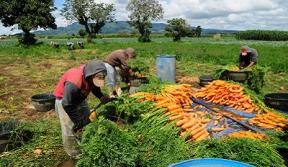USLEAP opposes free trade agreements that do not protect workers and supports efforts to strengthen protections for workers in trade agreements.
While workers' rights protections in Free Trade Agreements (FTAs) have become successively stronger, from the North American Free Trade Agreement (NAFTA) and the Dominican Republic-Central America Free Trade Agreement (CAFTA), to bilateral agreements with Colombia, Peru, Panama and Chile.
However, the protections included in all of these agreements have thus far proven to be inadequate. Moreover, the newer FTAs are not fundamentally different from NAFTA and CAFTA and do not represent a new model for global trade.
Meanwhile, the proposed mega-trade agreement, the Trans-Pacific Partnership (TPP), which would include Peru and Mexico, relies on the same failed labor enforcement mechanisms of these past agreements. USLEAP supports efforts to block the negotiation of more FTAs using this flawed model.
U.S.-Peru Trade Promotion Agreement (PTPA)
In July of 2015, ILRF and seven Peruvian unions filed a complaint with the U.S. Department of Labor (DOL) alleging that the Government of Peru is failing to comply with the labor standards contained in the U.S.-Peru Trade Promotion Agreement (PTPA). The complaint alleges that the Government of Peru is failing to enforce basic labor laws in its garment, textile, and agricultural export sectors, which together employ hundreds of thousands of workers who produce billions of dollars of goods for the U.S. market. For more information on the complaint and what it could mean for workers, see ILRF's press release on DOL's report confirming allegations made in the complaint.
Colombia FTA
For five years, USLEAP worked extensively to block a vote on a Free Trade Agreement (FTA) with Colombia, which was initally signed by both governments in late 2006. In October 2011, Congressional approval of the Colombia FTA came despite the failure to adequately implement a Labor Action Plan and the absence of any significant progress in ending impunity for violence against trade unionists. In May 2012, the Obama Administration implemented the Colombia FTA, prematurely giving up its best source of leverage to pressure the Colombian government to improve respect for worker rights. In 2016, the AFL-CIO filed a complaint against the government of Colombia for failing to comply with the FTA's labor rights chapter.
NAFTA and CAFTA
The worker rights protections in CAFTA and NAFTA represented a big step back from those that governed U.S. trade policy with Central America and Mexico prior to the passage of CAFTA and NAFTA. The labor standards were higher and sanctions more immediate and better targeted than under CAFTA and NAFTA. The first CAFTA labor complaint was filed in April 2008 by the AFL-CIO and six Guatemalan trade unions. While each stage of the complaint process has been repeatedly delayed, violence against trade unionists has increased, there has been little progress addressing other worker rights concerns, and no sanctions have yet been applied to Guatemala.
The AFL-CIO and two dozen Honduran unions filed a CAFTA labor complaint against Honduras in March 2012. The governments of the United States and Honduras signed a monitoring and action plan in December 2015. USLEAP has been working with allies to track Honduras' compliance with the plan, and document and share information on continued violations with the U.S. Department of Labor.
Using U.S. Trade Policy to Promote Worker Rights
The passage of Free Trade Agreements has been eliminating the leverage provided by the worker rights provisions of U.S. trade programs, lowering standards and weakening enforcement mechanisms.
USLEAP, among others, has used trade pressure as a tool to support general improvements in the worker rights situation in Latin American countries like reduced violence in Colombia and labor law reform in Ecuador as well as to support workers organizing at particular worksites (e.g. Phillips-Van Heusen and Choi & Shin apparel workers in Guatemala).
USLEAP applies trade pressure from the U.S. (e.g. threats of losing U.S. trade benefits or opposition to specific trade agreements) only with the support of workers from the region to avoid the appearance of prioritizing domestic concerns.
"Fast Track"
"Fast track" is the authority granted by Congress to the President to negotiate trade agreements that cannot be amended by Congress. USLEAP opposed the 2015 renewal of "fast track" authority without major changes in global trade rules. Many groups concerned about free trade agreements have rallied around a new model for trade proposed by the TRADE Act: the Trade Reform, Accountability, Development and Employment Act.
With support, USLEAP's work on trade has:
- Broken new ground by testing a key provision of the “May 10th Agreement,” arguing that Peru’s Non-Traditional Export Promotion Law fails to comply with minimum standards on freedom of association adopted by the International Labor Organization (ILO);
- Helped delay the Colombia Free Trade Agreement from coming to a vote for five years, in part by providing continuing and concise documentation on violence and impunity;
- Helped win labor law reform, new labor courts, and increases in the minimum wage in Guatemala;
- Helped win first convictions for violence against trade unionists in Guatemala;
- Won legal recognition of trade unions in clothing factories in Central America;
- Helped win a temporary delay in implementing "race to the bottom" rules for the banana trade;
- Helped put reform labor law in Ecuador on the political agenda for both the U.S. and Ecuadorian governments;
- Submitted worker rights petitions on Guatemala and Ecuador and backed complaints filed on Mexico;
- Testified before the U.S. Trade Representative;
- Organized fact-finding delegations to Guatemala, Ecuador, and Colombia, and more.
Click here for more about ILRF's work on trade.

